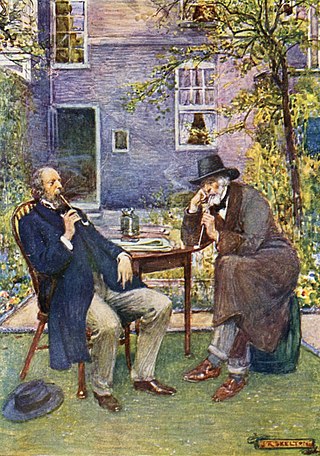Related Research Articles
This article contains information about the literary events and publications of 1881.
This article contains information about the literary events and publications of 1875.
This article contains information about the literary events and publications of 1867.
This article contains information about the literary events and publications of 1866.
This article contains information about the literary events and publications of 1864.
In these times of ours, though concerning the exact year there is no need to be precise...
This article contains information about the literary events and publications of 1863.
This article contains information about the literary events and publications of 1859.
This article contains information about the literary events and publications of 1857.
This article contains information about the literary events and publications of 1854.
This article contains information about the literary events and publications of 1853.
This article contains information about the literary events and publications of 1849.
Whether I shall turn out to be the hero of my own life, or whether that station will be held by anybody else, these pages must show.
This article contains information about the literary events and publications of 1848.
This article contains information about the literary events and publications of 1847.
This article contains information about the literary events and publications of 1844.
This article contains information about the literary events and publications of 1816.
This article contains information about the literary events and publications of 1800.

Victorian literature is English literature during the reign of Queen Victoria (1837–1901). The 19th century is considered by some the Golden Age of English Literature, especially for British novels. In the Victorian era, the novel became the leading literary genre in English. English writing from this era reflects the major transformations in most aspects of English life, from scientific, economic, and technological advances to changes in class structures and the role of religion in society. The number of new novels published each year increased from 100 at the start of the period to 1000 by the end of it. Famous novelists from this period include Charles Dickens, William Makepeace Thackeray, the three Brontë sisters, Elizabeth Gaskell, George Eliot, Thomas Hardy, and Rudyard Kipling.
Nationality words link to articles with information on the nation's poetry or literature.
Nationality words link to articles with information on the nation's poetry or literature.
Nationality words link to articles with information on the nation's poetry or literature.
References
- ↑ John Storey (20 May 2016). The Making of English Popular Culture. Routledge. p. 79. ISBN 978-1-317-51967-6.
- ↑ Deutsche Sprache in Europa und Übersee (in German). F. Steiner. 1979. p. 97. ISBN 978-3-515-02993-3.
- ↑ "Tennyson Reading 'Maud'". Pre-Raphaelite Online Resource. Birmingham Museums & Art Gallery . Retrieved 2013-05-09.
- ↑ Thomas, William (2004). "Macaulay, Thomas Babington, Baron Macaulay (1800–1859)". Oxford Dictionary of National Biography (Online ed.). Oxford University Press. doi:10.1093/ref:odnb/17349 . Retrieved 2014-06-05.(subscription or UK public library membership required)
- ↑ Marina Balina; Helena Goscilo; Mark Lipovetsky (25 October 2005). Politicizing Magic: An Anthology of Russian and Soviet Fairy Tales. Northwestern University Press. p. 10. ISBN 978-0-8101-2031-0.
- ↑ Eliot, Simon (2004). "Hotten, John Camden (1832–1873)". Oxford Dictionary of National Biography (Online ed.). Oxford University Press. doi:10.1093/ref:odnb/13859 . Retrieved 2013-11-06.
- ↑ Hauge, Ingard (1975). "Poetisk realisme og nasjonalromantikk". In Beyer, Edvard (ed.). Norges Litteraturhistorie (in Norwegian). Vol. 2. Oslo: Cappelen. pp. 318–325.
- ↑ "Authors : Hungerford, Margaret W : SFE : Science Fiction Encyclopedia". www.sf-encyclopedia.com. Retrieved 19 January 2021.
- ↑ Pan American Union (1932). Bulletin of the Pan American Union. The Union. p. 96.
- ↑ Sieburth, Richard (1999). Gerard de Nerval: Selected Writings. London: Penguin. p. xxxi.
- ↑ "Charlotte Brontë | British author". Encyclopedia Britannica. Retrieved 8 April 2019.